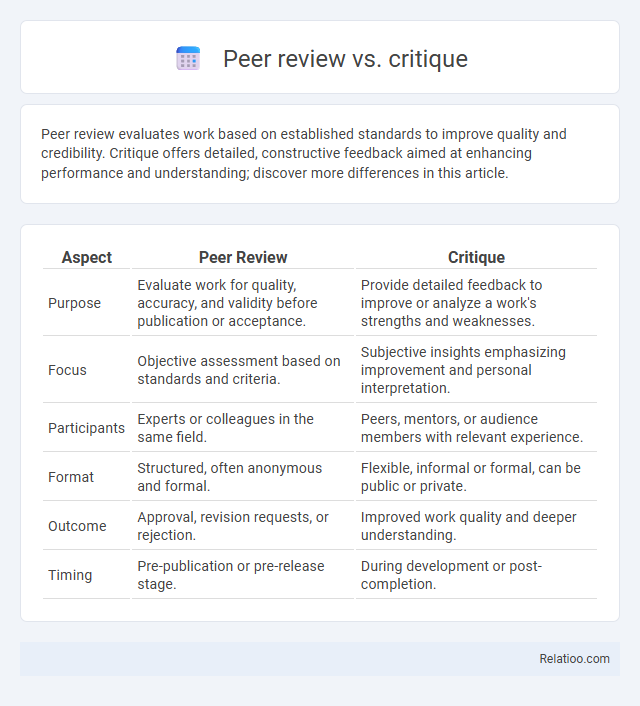Peer review evaluates work based on established standards to improve quality and credibility. Critique offers detailed, constructive feedback aimed at enhancing performance and understanding; discover more differences in this article.
Table of Comparison
| Aspect | Peer Review | Critique |
|---|---|---|
| Purpose | Evaluate work for quality, accuracy, and validity before publication or acceptance. | Provide detailed feedback to improve or analyze a work's strengths and weaknesses. |
| Focus | Objective assessment based on standards and criteria. | Subjective insights emphasizing improvement and personal interpretation. |
| Participants | Experts or colleagues in the same field. | Peers, mentors, or audience members with relevant experience. |
| Format | Structured, often anonymous and formal. | Flexible, informal or formal, can be public or private. |
| Outcome | Approval, revision requests, or rejection. | Improved work quality and deeper understanding. |
| Timing | Pre-publication or pre-release stage. | During development or post-completion. |
Introduction to Peer Review and Critique
Peer review involves a systematic evaluation of scholarly work by experts in the same field to ensure accuracy, validity, and originality before publication. In contrast, critique is a detailed analysis and assessment of a work's strengths and weaknesses, often aimed at improving the content or fostering discussion. Understanding the distinctions between peer review and critique is essential for researchers seeking constructive feedback and quality assurance in academic writing.
Defining Peer Review
Peer review is a systematic evaluation process where experts in the same field assess the quality, validity, and originality of research work before publication. Unlike a critique, which provides subjective feedback emphasizing strengths and weaknesses, peer review follows standardized criteria ensuring academic rigor and credibility. Peer review serves as a quality control mechanism essential for maintaining scientific integrity and advancing knowledge within scholarly communities.
Understanding Critique
Understanding critique involves recognizing its purpose as a detailed evaluation aimed at improving the quality and depth of work through constructive feedback. Unlike peer review, which primarily focuses on validating research for accuracy, reliability, and relevance, critique emphasizes analytical insight and thoughtful interpretation to foster growth and refinement. This distinction highlights critique's role in engaging with content critically to enhance both form and substance.
Key Differences Between Peer Review and Critique
Peer review involves a formal evaluation process where experts assess the quality, validity, and significance of a work, often used in academic publishing to ensure rigor and accuracy. Critique, on the other hand, is a more subjective analysis focused on providing constructive feedback aimed at improving clarity, style, and argument strength. Key differences lie in the purpose and scope: peer review emphasizes quality control and validation, while critique centers on detailed feedback to enhance the content's effectiveness and presentation.
Purpose and Objectives of Peer Review
Peer review serves the purpose of evaluating scholarly work to ensure accuracy, validity, and originality before publication, focusing on enhancing the quality and credibility of research. Critique, in contrast, involves a detailed analysis and interpretation aiming to identify strengths and weaknesses for improvement, often used in academic and artistic contexts. The objective of peer review is primarily to uphold scientific integrity by providing constructive feedback from experts, whereas critique emphasizes subjective assessment and personal insight.
Purpose and Objectives of Critique
Peer review evaluates your work's accuracy, reliability, and adherence to standards, primarily for quality assurance in academic or professional contexts. Critique focuses on offering in-depth analysis and interpretation to assess strengths, weaknesses, and meaning, fostering improvement and deeper understanding. The purpose of critique is to guide your development by highlighting areas for refinement and encouraging critical thinking.
Methods and Processes Involved
Peer review involves a structured evaluation process where experts assess research quality, methodology, and validity before publication, ensuring adherence to academic standards. Critique entails a detailed analysis focusing on strengths, weaknesses, and improvements, often emphasizing subjective interpretation and constructive feedback. The critical review process combines objective assessment with interpretative insights, utilizing systematic methods like rubric-based scoring, evidence triangulation, and iterative revisions to enhance overall content quality.
Advantages and Disadvantages of Each Approach
Peer review offers the advantage of diverse perspectives, enhancing the quality and credibility of your work, but it may be limited by the reviewers' expertise and potential biases. Critique provides detailed, targeted feedback that can improve specific aspects of your project, though it might lack the breadth found in peer reviews and can sometimes be subjective. Self-critique empowers you to identify personal strengths and weaknesses, fostering growth, but it risks overlooking blind spots and lacks external validation.
Real-World Applications and Examples
Peer review involves evaluating work by colleagues within the same field, ensuring accuracy and credibility in academic publishing and professional projects. Critique goes beyond identifying errors by offering constructive feedback aimed at improvement, often used in artistic and design fields to refine concepts and execution. Your ability to distinguish these processes enhances collaboration and quality control in real-world settings such as research development, creative industries, and product testing.
Choosing the Right Approach: Peer Review vs Critique
Choosing the right approach between peer review and critique hinges on the purpose and context of the evaluation process. Peer review is ideal for academic or professional settings where objective assessment, validation, and quality control are crucial, often involving structured feedback from multiple experts. Critique, however, emphasizes detailed analysis and constructive feedback aimed at improving an individual's work, making it more suitable for creative projects or developmental stages.

Infographic: Peer Review vs Critique
 relatioo.com
relatioo.com